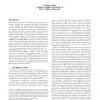Free Online Productivity Tools
i2Speak
i2Symbol
i2OCR
iTex2Img
iWeb2Print
iWeb2Shot
i2Type
iPdf2Split
iPdf2Merge
i2Bopomofo
i2Arabic
i2Style
i2Image
i2PDF
iLatex2Rtf
Sci2ools
MOBIHOC
2015
ACM
2015
ACM
The Value-of-Information in Matching with Queues
We consider the problem of optimal matching with queues in dynamic systems and investigate the value-of-information. In such systems, the operators match tasks and resources stored in queues, with the objective of maximizing the system utility of the matching reward profile, minus the average matching cost. This problem appears in many practical systems and the main challenges are the no-underflow constraints, and the lack of matching-reward information and system dynamics statistics. We develop two online matching algorithms: Learning-aided Reward optimAl Matching (LRAM) and Dual-LRAM (DRAM) to effectively resolve both challenges. Both algorithms are equipped with a learning module for estimating the matching-reward information, while DRAM incorporates an additional module for learning the system dynamics. We show that both algorithms achieve an O( +δr) close-to-optimal utility performance for any > 0, while DRAM achieves a faster convergence speed and a better delay compared ...
Related Content
| Added | 14 Apr 2016 |
| Updated | 14 Apr 2016 |
| Type | Journal |
| Year | 2015 |
| Where | MOBIHOC |
| Authors | Longbo Huang |
Comments (0)

